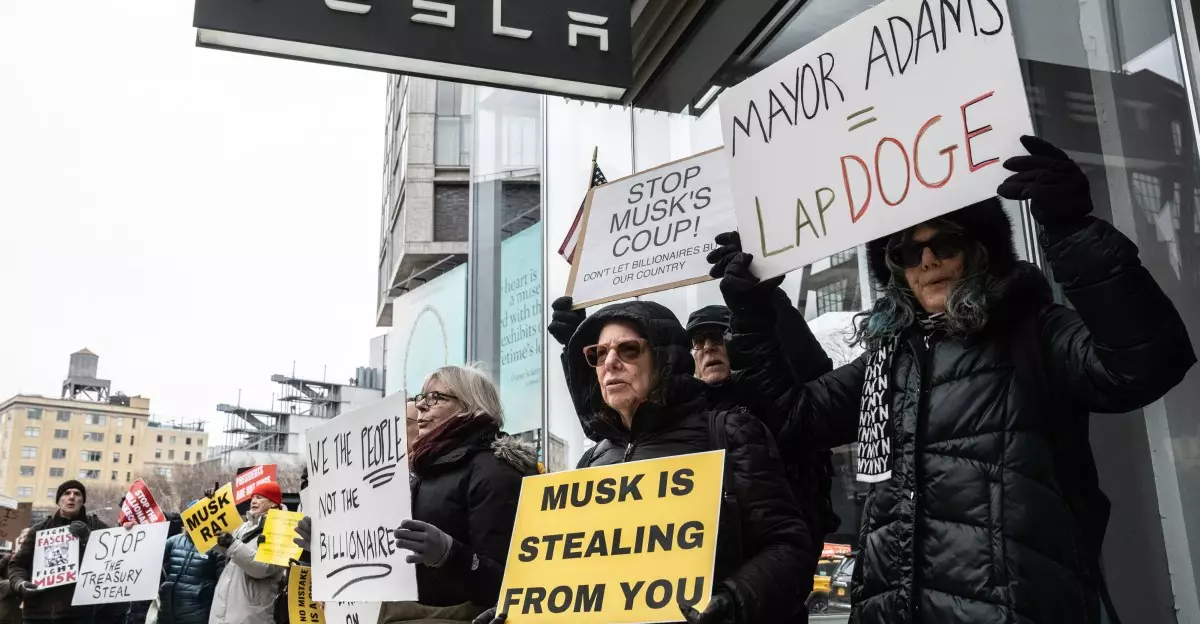In a significant public display of discontent, protestors have staged demonstrations outside Tesla showrooms across various parts of the United States. This coincided with a burgeoning movement identified as “#TeslaTakeover,” which gained traction on social media platforms including Twitter and the alternative site, Bluesky. The protests are mainly a reaction to the perceived divisive leadership of Tesla’s CEO, Elon Musk, particularly in his role as the head of the Department of Government Efficiency since Donald Trump assumed the presidency.
The gatherings, though varied in size, have been widely dispersed, taking place in cities like New York City and in less prominent locales such as Golden Valley, Minnesota. The Action Network, a site dedicated to coordinating protests, highlights upcoming rallies in a mix of those “hot” and less populous regions, including Ohio, Florida, Washington, New Mexico, and as far as Alberta, Canada. This widespread mobilization indicates a growing frustration not just localized but radiating out into communities across North America.
Impact on Tesla’s Reputation and Stock Performance
Investor sentiment has shown significant concern regarding Musk’s activities, especially as Tesla’s stock price has dropped by 21% since Trump’s inauguration, as reported by ABC News. This downturn raises questions about the alignment between Musk’s political engagements and the financial health of Tesla. Significant internal discussions among employees have led to remarks that the company might benefit from Musk stepping down, according to sources covered by The Washington Post. This highlights a dissonance that exists at the intersection of employee morale and corporate leadership dynamics.
With the protests underway, one of the more notable gatherings occurred outside Tesla’s Manhattan showroom, where demonstrators voiced their discontent by chanting slogans such as “Don’t buy swasticars” and “Elon Musk can go to Mars; we don’t need your Nazi cars.” These chants are seen as direct references to Musk’s controversial affiliations with far-right groups and behaviors deemed troubling by segments of the public.
The dissent isn’t limited to Tesla as a company but has expanded into a broader critique of Musk’s influence in various domains, particularly regarding his support for political movements that some view as extremist. Demonstrations have popped up not just in major metropolitan areas like Boston, Seattle, and Austin, but also in places where one might not expect such activism. Pictures from protests in cities like Corte Madera and Pasadena, California, further illustrate the diverse geographic spread of this movement.
Celebrities have joined the charge against Musk, with notable figures such as Alex Winter promoting the protests on social media, fostering a communal spirit among demonstrators. Winter posted images from various locations where individuals rallied against Tesla, consolidating the sense that this isn’t merely a local or isolated effort but part of a larger, interconnected campaign against contentious corporate leadership.
Creative approaches to protest have also emerged, showcasing the solidarity among participants and the innovation of the movement. Musician Sheryl Crow joined the fray by sharing a video of a Tesla being towed away, alongside a message outlining the importance of moral alignment—”There comes a time when you have to decide who you are willing to align with. So long Tesla.” This form of protest extends beyond traditional demonstrations to utilize social media as a tool for narrative-shaping and awareness.
While some protests gathered momentum, others have proved less impactful, as seen in cities like Pittsburgh, where the turnout was minimal. Yet even these smaller displays contribute to the narrative that dissent against Musk continues to brew, culminating in a coordinated effort that is expected to carry over into President’s Day with even more demonstrations scheduled for locations like Maine and Virginia.
The ongoing protests reflect a larger cultural discontent regarding corporate leadership and accountability, particularly exemplified in the realm of Elon Musk and Tesla. As the movement gains traction, it serves as a reminder that the voice of the consumer and stakeholders is a powerful force that can influence not only company policies but also transition the broader societal dialogue around responsible corporate behavior. Whether this movement will result in tangible changes within Tesla or evoke a more significant reckoning about leadership in the tech industry remains to be seen. However, what is clear is that the collective sentiment against Musk is resonating widely, indicating a potential shift in the landscape of corporate America.


Leave a Reply